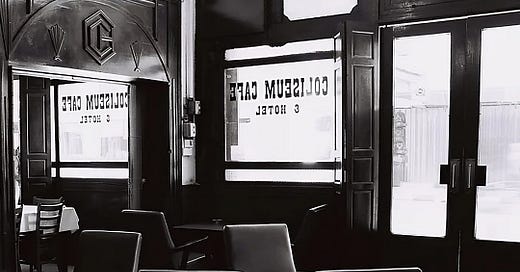PODCAST
Whenever I came back to Kuala Lumpur, I’d head for the Coliseum Café . It stood on Jalan Tuanka Abdul Rhaman for so long it is hard now to think of the street without it. Reassuringly shabby, always relaxed, I usually found in the dining room or the bar someone I wanted to meet again. If there was ever a monument in KL that outlived the age of British colonial rule and might be called ‘beloved’ then, to general assent, the old Coliseum Café was it.
Coliseum Café Kuala Lumpur
The Coliseum closed its doors a few years back, just months short of its hundredth birthday, killed not only by Covid but by time. One of the best watering holes, in one of the fanciest corners of town , the Coliseum did not leave town , rather it might be said that Kuala Lumpur moved on and left it behind.
I was lucky to know it in its final years. Its long-ago clientele in the 1920’s , when it first opened its doors , would have been I’d guess, rather posh, a little stiff and very British: tea planters, tin miners , army officers and colonial bigwigs of assorted importance. The came for tea and a foxtrot , or for a bite of tiffin or for that essential lubrication, a tumbler or two of scotch and soda, heavy with crushed ice, known as a stengah. In recent years, they came to be supplanted by large , audible Australians . The Coliseum’s regulars , to the last, were a mix of humanity as varied and as local as the dishes on the menu .
It was noted for its Hainanese Chinese cooking as well as reliable comfort food from ‘Home’. On the menu, oxtail soup and fish and chips sat happily beside chicken and rice and egg foo yong. It was renowned for its bar, its venerable waiting staff and, above all , for the celebrated sizzle that went with the steak. Grilled at your table, it gave off such steam when meat hit hot metal , those unused to the ceremony stepped back from the table, napkins held to faces like fire curtains.
The Coliseum Café meant many things to many people. It was once the epitome of elegance, smart enough to host weekly the dansants and KL’s premier ‘picture palace’ and in its Edwardian heyday, so the posters say, it offered its customers ‘cleanliness, comfort and courtesy’. Judging by the mincing alliteration , it was rather worrying sales pitch, if you ask me . So precariously on the social pinnacle did it balance, I suppose, that the only way was down. But its decline was slow , graceful , stylish and uncomplaining.
Above all, it was fun and its secret charm was the way the place invited and encouraged a degree of relaxed conversation that is the most remarkable of Malay’s political achievements. I say political because, Malaysia is a place of competing ethnicities . Indigenous Malays, straits Chinese and Indian Tamils all have a claim to be Malaysian but some claims are more valid than others.
Indigenous Malays have a built-in advantage. If you qualify as a bhumiputra, a ‘son of the land’ or, as it is sometimes put, ‘a prince of the earth’ , and have the right caste certificate, your perks are notable. You might be eligible for a place at university, land and a discount on your mortgage . These perks are not always open to citizens of Indian and Chinese extraction and this, naturally, has led to some resentment. But then I am South African and racial resentment is the sauce we cook with - and in. But what I found in Malaysia and, more often that not at the Coliseum, was an enviable camaraderie that took little notice of ethnic favouritism.
On one of my last visits, I sat at the bar with Jimmi, a Chinese bookie , who had survived British colonial rule , a Japanese prison camp in the Second World War and a boyhood in gangland . He pulled up his sleeve to show me the tattoos marking him as once having been a member of a triad in Penang. His friend, Mohammed arrived next, a friendly cop when out of uniform, who talked not of gangs but of English soccer and the quality of the goals in that day’s match, beamed from Manchester. Next in was Krishna, a cabbie , who talked of the oddity of Britons at home and abroad .
Jimmi was puzzled by the British, then and now .
‘Australians, here in KL, call them Pommie Bastards. Why don’t they feel insulted?’
They all looked at me.
I said I could not help. ‘I’m South African.’
‘But you speak English,’ they said, as if this made me , at least lingually, a distant relation to the Pommy Bastards.
‘So do you,’ I said.
Krishna said. ‘I think they are very inscrutable. The English.’
That seemed about right. And we left it at that.
Christopher Hope





